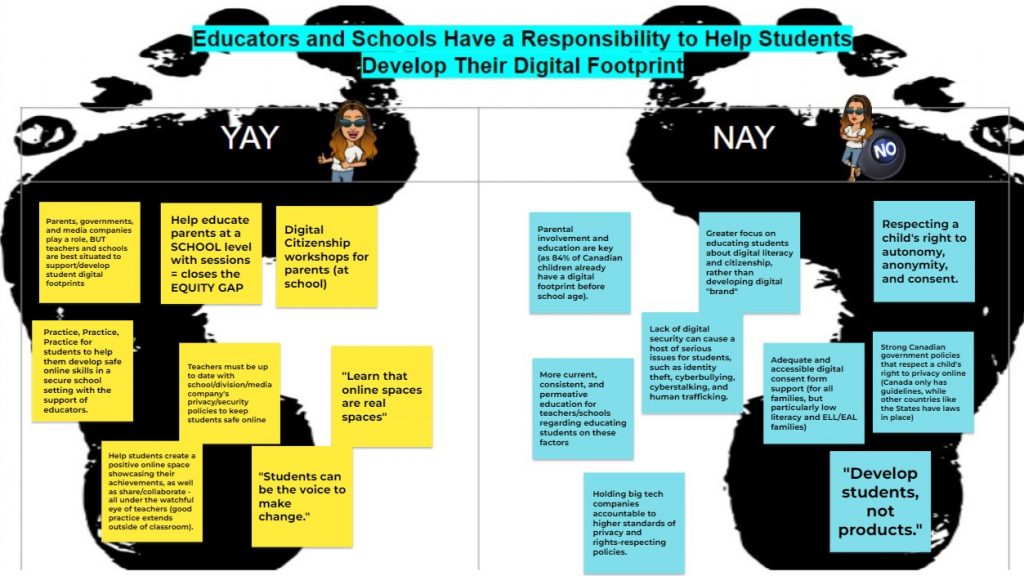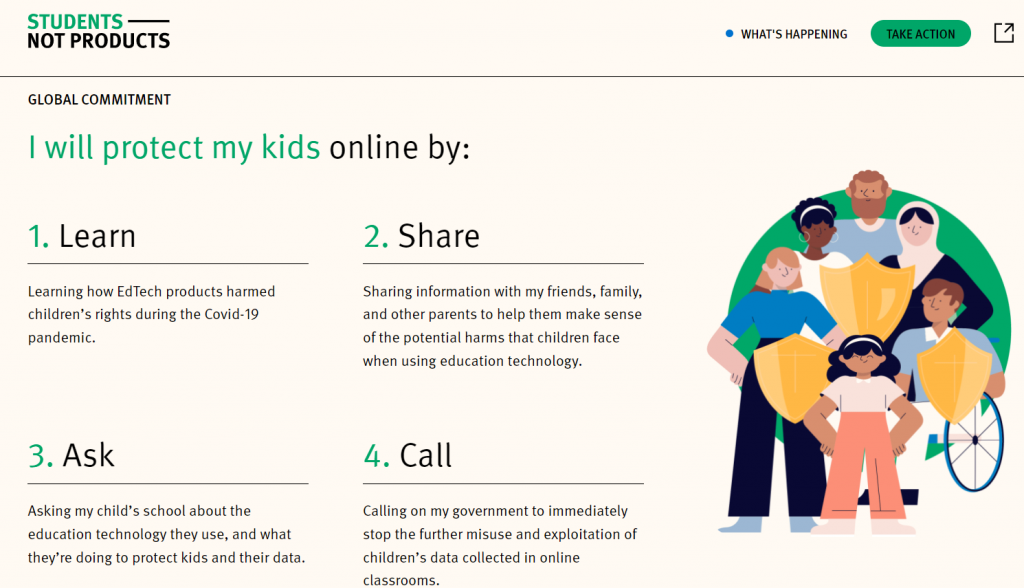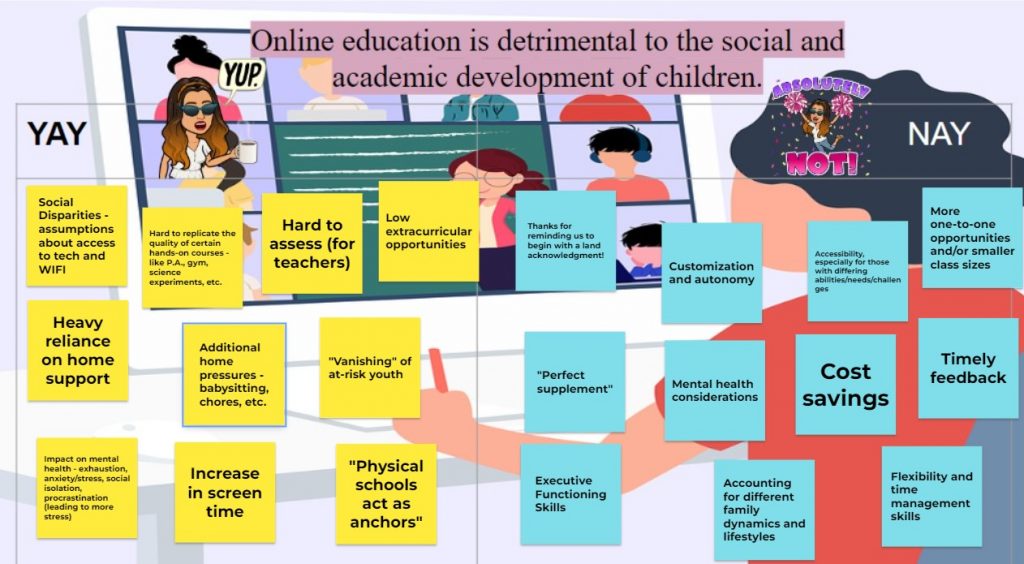
Playing the Digital Footprint Devil’s Advocate
And traversing the online teaching frontier… (Debates 7&8)
What happens when you have to debate as the opposition on a topic you wholeheartedly support? Short answer: It gets very messy inside your mind very quickly! When I volunteered to switch my stance for this debate and play “devil’s advocate,” I was almost exclusively thinking of one of my favourite books, Think Again, by Adam Grant.
In his book, Grant outlines how to develop the habit of thinking again: think like a scientist, define your identity in terms of values not opinions, and (of most importance here) seek out information that goes against your views. Make no mistake, despite how I debated Monday night, I am firmly in support of teachers and schools having a role in the development of children’s digital footprints. Of course, I wanted to see if I could convince myself of the opposite viewpoint…even just a little.
As always, let’s turn to the facts before I jump in with my final reflections (revealed in the video below…)

Debate 7 Final Reflection and Leftover Questions
In the end, I cannot dispute that teachers and schools play a role in helping students develop their digital footprints (you got me there, Rae and Funmi!). As educators, we act as guides for our students navigating a physical and now digital world. After playing devil’s advocate, the one caveat I can make in this case is that the development of student digital identities does not START with teachers and cannot END with them either. The responsibility is shared. We owe it to our children to hold parents, teachers/schools/divisions, governments, and online platforms accountable for creating safe online spaces for our children to explore their digital identities.
- As an educator (or similar), do you feel adequately supported by parents, your school/division, and professional resources/development when teaching students about digital citizenship and footprints?
- If you have received excellent resources and/or PD on this topic (to use with students), please share in the comments, including how it guided your classroom lessons and use of tech.
- How often do you check the terms of service agreement before signing off on something? Tell me I’m not the only one signing my life away 🙂

“I can’t but we can.”
-Anon.

Traversing the online teaching frontier…I think I got lost in Timbuktu – Debate 8
I was still reeling from my own debate (I really dislike pushing a one-sided viewpoint. Objectivity. ALL. THE. WAY!), but the subsequent online learning debate delivered a double-whammy to my solar plexus! I’ve been teaching online for almost 3 years now. To suggest it’s been detrimental to the social and academic development of the children I’ve worked with feels like a personal attack. It’s not, of course. Once more, I turn to the facts before I will jump in with my reflection…littered with 3 years of positive and negative experiences.

Debate 8 Final Reflections and Leftover Questions
After reading all the articles and listening to the debators and my classmates discuss this topic, I keep coming back to my own experiences over the last few years. I have the unique vantage point of having taught in the rushed, uncharted dynamic of the pandemic and then in a more developed, purposeful role as an OLST (online learning support services teacher). Teaching students from every school in every grade in my division is not for nothing. The highs and lows of online learning have changed me as an educator; changed my definitions of schools, classrooms, and teaching. To say that online learning is detrimental to students generalizes the concepts of physical schools and education as one-size-fits-all definitions. That is certainly not the case. When done properly, and by that, I mean MINDFULLY, online education can become a digital anchor for many families needing something different. Physical schools will always be needed, but online education is the perfect alternative.
- If you’re so inclined, please tell me about your own teaching experiences during the pandemic. Mine was oddly positive, but I know experiences vary greatly!
- How do you think pandemic teaching and current online teaching differ? Or do you think they do?
- What would you say to a family considering online? What factors should be taken into consideration?
- How do you feel about your own online education? Does it seem like a viable option as opposed to being on-campus? What works for you and what doesn’t?
What a great idea! Making it interactive with Jamboard! Thanks for sharing your learning journey!
Super interesting. As a teacher, I have to admit I never do. Will try to do better now with all this info. Thanks, Kim.
Sorry, Ali – never do what? Do you mean read the terms of service agreement? I never used to either, but I’m working on being more conscious of it now.
Debate 7 In education and schools, are they responsible for developing a digital footprint or helping to students TO CREATE a digital footprint? WE need TO TEACH appropriate digital skills to ward off long term consequences. There must be less reactive responses and more preventative measures. This is the agree side the discussion was to cultivate positive digital front print to have more community involvement to achieve positive digital footprints foster change in the digital technological policy. On the disagree side we need more security with kids on the internet. There is lack of parental control and mechanisms in place for children and the teacher need the digital skills to adapt with students today.
Debate 7 In education and schools, are they responsible for developing a digital footprint or helping to students TO CREATE a digital footprint? WE need TO TEACH appropriate digital skills to ward off long term consequences. There must be less reactive responses and more preventative measures. This is the agree side the discussion was to cultivate positive digital front print to have more community involvement to achieve positive digital footprints foster change in the digital technological policy. There were also major concerns with parental sharing of digital information prior to entering school. Another area of concern was the proper instruction for educators when relied upon to teach the digital aspect of technology with their students. The onus that parents who shared their child’s technology / digital information does not leave teachers at an advantage because it is already “footprinted on the internet”. So how do we address the issue?
On the disagree side we need more security with kids on the internet. There is lack of parental control and mechanisms in place for children and the teacher need the digital skills to adapt with students today. With teachers there needs to be advanced training for the 21st century. The training and specific skills taught to parents and students will rectify problems and curb the “foot printing” and add a more positive presence for universally for all involved. The controlled environment with properly explained rules and guidelines will be taught universally to ADDRESS current and future problems,
I ENJOYED the debate on both sides, and I often was not aware of the greater problem. I have become aware and I will continue to seek or address online foot printing that is safe for all involved/ Thank you for your input and hard work/